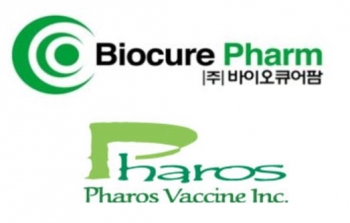기업
BiocurePharm Teams Up with Pharos Vaccine to Develop CART-T Cell Therapy
바이오스펙테이터 Euna Lee 기자

Korean biopharmaceutical company BiocurePharm will strengthen its oncology business through a partnership with Pharos Vaccine.
On December 5, both companies agreed to develop a cancer treatment called CAR-T cell therapy (CAR is short for chimeric antigen receptor). Under the partnership, BiocurePharm and Pharos Vaccine plan to finalize a preclinical study by the middle of next year, and will file an investigational new drug (IND) application in three countries, including Korea.
CAR-T cell therapy is a CD19-directed genetically modified autologous T-cell immunotherapy, which harnesses the body's immune system to take on cancer cells. To start treatment, a doctor removes white blood cells from a cancer patient, and the cells are taken to a manufacturing facility. The cells are then re-engineered to recognize cancer cells, and wipe them out. Those reprogrammed cells are sent back, and administered to the patient.
Despite the fact that Novartis’s Kymriah and Gilead Sciences’ Yescarta received U.S. Food and Drug Administration (FDA) approval this year as the first CAR-T cell therapies, no other Korean company has yet attempted to conduct any preclinical studies.
BiocurePharm officials said that, "We discussed this therapy with the Ministry of Food and Drug Safety (MFDS) regarding the test items in animal studies. Upon receiving favorable study findings, we will initiate phase I clinical trials in three countries: Germany (Charité University Hospital in Berlin), Canada, and Korea”.
Pharos Vaccine has secured a variety of proprietary technologies relating to CAR-T gene production, viral vector production, gene delivery, and cell proliferation, as well as cell treatment facilities.
BiocurePharm is seeking a commercial partner for this exciting program to undertake commercial development, and bring a product to the clinic. To this end, the company was listed in the Canadian Securities Exchange (CSE) as the first Korean biopharmaceutical company. In addition, BiocurePharm has vast experience in joint biological production projects through overseas networks.
Under closer collaboration, Pharos Vaccine will focus on developing platform technologies of CAR-T cell therapy along with the production of pilot batches, while BiocurePharm will undertake all clinical development programs, including commercialization.
The anti-CD19 CAR-T cell therapy project was recently designated as a national Consulting for Innovation Drug Development (CIDD) program, initiated by the Ministry of Health and Welfare, and the Korea Drug Development Fund.
“Based on our consultation with the MFDS, toxicology testing will be conducted to predict the distribution pattern and half-life of CAR-T cells", said Lee Sang-mok, CEO of BiocurePharm, in a telephone conversation with BioSpectator, a biopharma contents provider.
"Following the nonclinical studies, we expect to file IND applications in Germany, Canada, and Korea during the first half of 2018. Presently, we are contacting the Korean university hospitals to commence phase I clinical trials. We expect that the MFDS will grant us market authorization for CAR-T cell therapy as a basis of conditional approval at the end of 2019.”
CEO Lee noted that “Like Kymriah and Yescarta, our anti-CD19 CAR-T cell therapy will be indicated for treating B-cell lymphoblastic leukemia. We will strive to commercialize CAR-T cell therapy as soon as possible.”
Meantime, BiocurePharm and Pharos Vaccine have continued their mutual ties in an overseas mass production project of locally developed foot-and-mouth disease vaccine (FMD) from the end of 2016, as part of their efforts to expand FMD sales in the global arena.



















